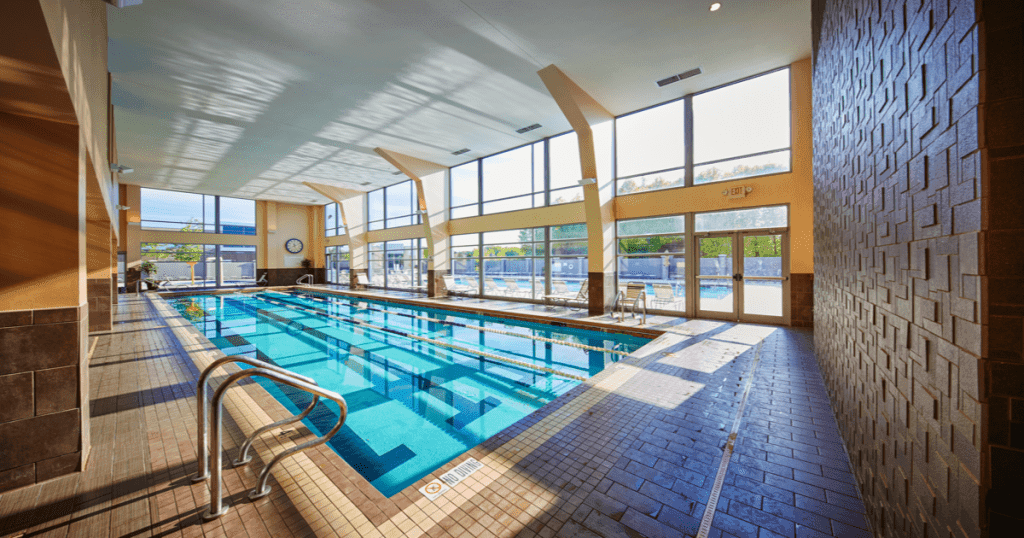
Our saltwater pools are less harsh on hair and skin than typical chemically treated pools. But how does a saltwater filtration system clean the pool? Get ready for a science lesson!
How Does a Salt Water Filtration System Work?
A typical swimming pool uses added chemicals to eliminate germs in the water. All of the swimming pools at Elite Sports Clubs feature a saltwater filtration system (note: this does not include the hot tubs). We often get asked, “How does salt clean the water?”
We dissolve salt (sodium chloride) directly into the pool water. The water then passes through a machine called a salt cell or salt generator. The salt generator sends an electrical current (a process known as electrolysis) through the sodium chloride molecule to break down or separate the salt.
The chemical reaction created by electrolysis creates chlorine in the form of sodium hypochlorite and hypochlorous acid. These sanitizing and disinfecting agents are the same as chlorine commonly used in swimming pools in solid or liquid form. A saltwater pool is not “chlorine-free” or “chemical-free.” The chlorine simply comes from a different source than it does in traditional pools.
What is the Difference Between a Saltwater and Traditional Pool?
An important difference between a traditional pool and a saltwater system is that saltwater pools have reduced amounts of chloramines. Chloramines are formed by the reaction of chlorine with an amine, usually from sweat, body oils, saliva, and other biological chemicals. When you smell chlorine or get eye and skin irritation, it is usually due to chloramines, not the chlorine itself. (This is why it is important to shower before entering the pool, especially if you’ve been working out!) Because the salt generators are continually producing chlorine as needed, saltwater pools have reduced levels of chloramines when compared to traditional pools.
The salt generators also work in reverse: when there is enough chlorine in the pool, they turn the excess back into salt. We only need to add salt to the pools to compensate for water drag out/splash out, water loss from backwashing the filters, and water dilution in the outdoor pools from rainwater. This is an important cost-saving benefit of saltwater pools. Salt levels are kept at around 4000 parts per million, about one-tenth of the salinity levels of the ocean.
The salt, chlorine, and pH levels in our pools are electronically monitored and adjusted automatically as needed. We also manually test all the pools at least once a day, as a double-checking measure to the computerized system. When you see our staff testing the water, please note that they are doing regular quality control checks for your benefit. We do have a liquid chlorine system as well, which adds additional chlorine to the pools at times when the saltwater systems can’t keep up.
Benefits of a Saltwater Pool
Benefits of saltwater pools include less offensiveness for those sensitive to traditional chlorine; gentler on the eyes, skin, hair, and swimsuits; less chemical handling; softer-feeling water; and less long-term cost to operate.
Saltwater pools at all of our locations are one of the great benefits Elite has to offer. If you haven’t yet, please come in to enjoy them. We offer swim lessons, open swim, pool parties, water exercise classes, swim club, and water personal training. At Elite, you can rest assured that you are benefitting from one of the safest pool options around. Contact our fitness experts today to get started!
Schedule a Tour!
Written by Jessica Heller, Aquatics Director at Elite Sports Club-Mequon
Jessica Heller has a B.S. in Biological Sciences, minor in Spanish (UW-Milwaukee, 1999), Doctor of Chiropractic (Northwestern Health Sciences University, 2002), and post-graduate continuing education focused mostly on rehabilitative exercise, sports injuries, and nutrition. She is a certified Water Safety Instructor (since 1996), Lifeguard/CPR/First Aid Instructor (since 2010), Red Cross Babysitting Instructor (since 2015), Certified Pool Operator (since 2013), Certified Strength and Conditioning Specialist (since 2006), Aquatic Exercise Association Aquatic Fitness Professional (since 2008), and Arthritis Foundation Aquatics Program Instructor (since 2011).